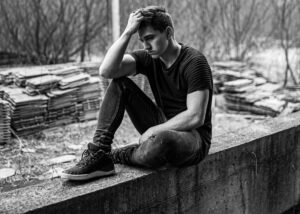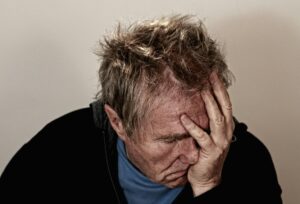Depressive Disorders(Depression)
Types | Symptoms | Causes | Remedies | In Children | In Adults | In Old Adults | Diagnosis | Risk Factors | Complications | Treatment |
Overview-
Depression is a commonplace mental health sickness characterized via continual emotions of disappointment, hopelessness, and a loss of hobby in every day sports. It can affect human beings of all ages and affords with emotional and physical signs together with fatigue, modifications in sleep or appetite, and trouble concentrating. Melancholy may be as a result of a combination of genetic, organic, environmental, and mental factors. Types encompass most crucial depressive sickness, continual depressive disease, seasonal affective sickness, and postpartum despair. Treatment generally entails a combination of remedy, medicinal drug, and way of lifestyles changes, at the same time as early intervention and strain manage can assist in prevention.

Types of Depression-
- Major Depressive Disorder (MDD): characterized by using extended periods of sadness, lack of hobby in activities, and different signs lasting at the least two weeks.
- Persistent Depressive Disorder (PDD or Dysthymia): A continual, low-grade shape of depression lasting for two years or greater.
- Bipolar Disorder: includes episodes of depression and mania or hypomania.
- Seasonal Affective disorder (sad): despair related to adjustments in seasons, usually worsening throughout the winter months.
- Postpartum depression: despair taking place after childbirth.
- Premenstrual Dysphoric ailment (PMDD): excessive shape of premenstrual syndrome (PMS) with mood-related signs and symptoms.
- Atypical Depression: A subtype of despair where temper improves temporarily in response to high-quality activities.
Symptoms-
- Emotional signs and symptoms: chronic sadness, hopelessness, irritability, lack of interest, feelings of worthlessness or guilt, suicidal mind.
- Physical symptoms: Fatigue, modifications in urge for food or weight, sleep disturbances (insomnia or oversleeping), restlessness, aches and pains.
Causes-
- Biological factors: Imbalance in brain chemical substances like serotonin, dopamine, and norepinephrine.
- Genetic factors: circle of relatives records of melancholy increases chance.
- Psychological factors: continual strain, trauma, or huge life adjustments.
- Environmental factors: loss of social guide, economic stress, publicity to violence or overlook.
- Medical conditions: chronic illnesses, hormonal adjustments, or substance abuse.
Natural Remedies for Depression-
- Exercise: normal physical activity can increase temper through freeing endorphins.
- Diet: A weight loss plan rich in omega-3 fatty acids, antioxidants, and folate may additionally lessen depressive signs.
- Sunlight: Spending time outdoors or the usage of light therapy can enhance temper, particularly for people with sad.
- Mindfulness and Meditation: Practices like meditation, yoga, and deep breathing can help manage symptoms.
- Herbal Supplements:
- St. John’s Wort: Commonly used for mild depression, but it may interact with medications.
- Omega-3 fatty acids: Found in fish oil, it may help reduce depressive symptoms.
- SAM-e: A naturally occurring compound that may improve mood but should be used cautiously.
- Sleep hygiene: Establishing a regular sleep routine can help alleviate symptoms.
Depression in Children-
- Symptoms: Irritability, disappointment, retreating from social sports, bad instructional performance, adjustments in appetite, hassle drowsing.
- Causes: Bullying, circle of relatives battle, instructional strain, or genetic predisposition.
- Treatment: Psychotherapy (specifically play remedy for more youthful children), own family counseling, and in excessive cases, medicinal drug.
Depression in Adults-
- Symptoms: chronic low temper, fatigue, issue concentrating, adjustments in sleep or appetite, feelings of worthlessness.
- Causes: work strain, courting issues, health concerns, financial pressures.
- Treatment: Cognitive-behavioral therapy (CBT), antidepressant medicines, lifestyle modifications.
Depression in Older Adults-

- Symptoms: reminiscence problems, physical proceedings (aches, pains), social withdrawal, fatigue, irritability.
- Causes: health problems, lack of cherished ones, social isolation, retirement.
- Treatment: Counseling, medicines adjusted for older adults, social support, ordinary physical pastime.
Diagnosis of Depression-
- Clinical interview: A mental health expert assesses symptoms, period, and impact on day by day existence.
- Diagnostic equipment: The affected person fitness Questionnaire (PHQ-nine) or Beck depression stock.
- Physical exams: To rule out underlying clinical conditions (e.G., thyroid problems).
- Blood exams: on occasion performed to test for diet deficiencies or hormonal imbalances.
Risk Factors-
- Family history: Depression tends to run in families.
- Trauma or abuse: Early life trauma, abuse, or neglect increase vulnerability.
- Chronic stress: Long-term stress from personal or professional circumstances.
- Gender: Women are more likely to experience depression, possibly due to hormonal factors.
- Substance abuse: Alcohol or drug misuse can trigger or worsen depression.
Complications-
- Bodily fitness: Untreated depression can worsen situations like heart sickness, diabetes, or chronic pain.
- Suicide chance: human beings with excessive despair are at a higher danger for suicidal mind and behaviors.
- Social and courting problems: issue maintaining friendships or own family relationships.
- Work or academic problems: Impaired overall performance, absenteeism, or process loss.
Treatment of Depression-
- Psychotherapy:
- Cognitive-behavioral remedy (CBT): permits assignment and reframe terrible perception styles.
- Interpersonal therapy (IPT): makes a speciality of enhancing communication and resolving conflicts in relationships.
- Psychodynamic treatment: Explores past reports and unresolved troubles contributing to melancholy.
- Medicinal drugs:
- Selective serotonin reuptake inhibitors (SSRIs): common antidepressants like fluoxetine (Prozac), sertraline (Zoloft), and escitalopram (Lexapro).
- Serotonin-norepinephrine reuptake inhibitors (SNRIs): Like venlafaxine (Effexor) or duloxetine (Cymbalta).
- Tricyclic antidepressants (TCAs): frequently used whilst different medications are ineffective.
- Strange antidepressants: Like bupropion (Wellbutrin) which targets special neurotransmitters.
- Lifestyle changes: ordinary workout, a healthful food regimen, organising a habitual, and social interplay.
- Different treatments:
- Electroconvulsive therapy (ECT): For intense or remedy-resistant despair.
- Transcranial magnetic stimulation (TMS): A non-invasive mind stimulation treatment.
- Ketamine: For speedy alleviation of depressive signs, specifically in treatment-resistant cases.


3 thoughts on “Depressive Disorders (Depression) – Types, symptoms And Treatment.”